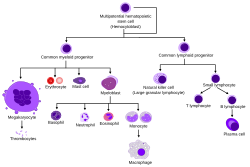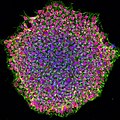these epigenetic markers during stem cell differentiation through in vitro differentiation of murine embryonic stem (ES) cells. Embryonic stem cells exhibit...
28 KB (3,692 words) - 00:32, 16 December 2024
Cellular differentiation is the process in which a stem cell changes from one type to a differentiated one. Usually, the cell changes to a more specialized...
53 KB (6,223 words) - 03:14, 7 June 2025
In multicellular organisms, stem cells are undifferentiated or partially differentiated cells that can change into various types of cells and proliferate...
102 KB (11,722 words) - 11:06, 9 June 2025
Hematopoietic stem cells (HSCs) are the stem cells that give rise to other blood cells. This process is called haematopoiesis. In vertebrates, the first...
38 KB (4,500 words) - 05:53, 17 August 2024
may be differentiable into dopaminergic neurons. Stem cell-associated genes were downregulated after differentiation. Cardiac differentiation: iPSCs were...
92 KB (10,517 words) - 16:41, 2 June 2025
of cell potency, totipotency represents the cell with the greatest differentiation potential, being able to differentiate into any embryonic cell, as...
33 KB (3,691 words) - 19:11, 25 May 2025
neural differentiation. NSCs are stimulated to begin differentiation via exogenous cues from the microenvironment, or stem cell niche. Some neural cells are...
35 KB (4,177 words) - 02:23, 18 September 2024
example of an epigenetic change in eukaryotic biology is the process of cellular differentiation. During morphogenesis, totipotent stem cells become the...
159 KB (18,196 words) - 20:03, 3 June 2025
Reprogramming (redirect from Epigenetic reprogramming)
In biology, reprogramming refers to erasure and remodeling of epigenetic marks, such as DNA methylation, during mammalian development or in cell culture...
49 KB (5,387 words) - 20:42, 24 April 2025
progenitor cells. A precursor cell is a stem cell with the capacity to differentiate into only one cell type, meaning they are unipotent stem cells. In embryology...
8 KB (790 words) - 12:45, 24 May 2025
followed by cellular differentiation into mature gametes, either eggs or sperm. Unlike animals, plants do not have germ cells designated in early development...
31 KB (4,040 words) - 22:46, 3 April 2025
cancer cells. CSCs may generate tumors through the stem cell processes of self-renewal and differentiation into multiple cell types. Such cells are hypothesized...
88 KB (10,587 words) - 03:56, 19 May 2025
stem cells. Though recent studies have put in question how similar iPS cells are to embryonic stem cells. Epigenetic memory in iPS affects the cell lineage...
48 KB (6,014 words) - 21:33, 9 June 2025
Hale JS, Ahmed R (July 2013). "T-cell memory differentiation: insights from transcriptional signatures and epigenetics". Immunology. 139 (3): 277–84. doi:10...
32 KB (3,781 words) - 20:52, 25 May 2025
A spermatogonial stem cell (SSC), also known as a type A spermatogonium, is a spermatogonium that does not differentiate into a spermatocyte, a precursor...
23 KB (2,854 words) - 11:34, 9 June 2025
stem cells. Not all stem cell research involves human embryos. For example, adult stem cells, amniotic stem cells, and induced pluripotent stem cells...
59 KB (7,159 words) - 03:29, 11 June 2025
Hallmarks of aging (redirect from Stem cell exhaustion)
Pillars of Aging', in which just three of the 'hallmarks of aging' are included (stem cells and regeneration, proteostasis, epigenetics). The seven pillars...
40 KB (4,327 words) - 09:01, 9 June 2025
Epigenetics of human development is the study of how epigenetics (hertiable characteristics that do not involve changes in DNA sequence) effects human...
45 KB (6,147 words) - 14:14, 8 June 2025
Moreau J, Stahl M and Rogers D (1988) Inhibition of pluripotential embryonic stem cell differentiation by purified polypeptides. Nature, 336, 688–690...
13 KB (1,750 words) - 22:20, 23 April 2025
explores the ways in which epigenetics can be used to regulate neurogenesis. Neurogenesis is the production of neurons from neural stem cells, which are critical...
69 KB (8,185 words) - 00:55, 24 May 2025
B cell recognizing the same epitope. B cells develop from hematopoietic stem cells (HSCs) that originate from bone marrow. HSCs first differentiate into...
32 KB (3,746 words) - 11:54, 10 June 2025
Adult stem cells are undifferentiated cells, found throughout the body after development, that multiply by cell division to replenish dying cells and regenerate...
52 KB (5,969 words) - 21:59, 6 April 2025
cells, focusing in on a single stem cell will help determine specific signaling activity associated with varying degrees of stem cell differentiation...
5 KB (708 words) - 08:13, 9 February 2024
pluripotency: primed to differentiate into specific cell lineages. Naïve pluripotent stem cells (e.g. ESC) and primed pluripotent stem cells (e.g. EpiSC) not...
8 KB (968 words) - 01:29, 3 April 2025
Cerebral organoid (redirect from Brain in a dish)
artificially grown, in vitro, tissue resembling parts of the human brain. Neural organoids are created by culturing pluripotent stem cells into a three-dimensional...
52 KB (6,270 words) - 08:53, 28 May 2025
Transdifferentiation (redirect from Cell transdifferentiation)
stem cells require that one navigate legal loopholes and delve into the morality of stem cell research debate. Epigenetics Induced pluripotent stem cell...
32 KB (3,422 words) - 09:23, 10 June 2025
and self-renewal of hematopoietic stem cells are favoring elements of stem cell pool maintenance while differentiation, mobilization and senescence are...
21 KB (2,583 words) - 16:58, 29 April 2025
Multiple myeloma (redirect from Plasma cell myeloma)
marks in multiple myeloma is similar to undifferentiated precursor and stem cells. These results may represent a de novo epigenetic reprogramming in multiple...
129 KB (13,217 words) - 21:35, 29 May 2025
Cancer epigenetics is the study of epigenetic modifications to the DNA of cancer cells that do not involve a change in the nucleotide sequence, but instead...
111 KB (12,542 words) - 09:15, 9 June 2025
cells facilitate therapeutic action: Stem, progenitor, or mature cell engraftment, differentiation, and long-term replacement of damaged tissue. In this...
38 KB (4,236 words) - 02:43, 2 June 2025



















